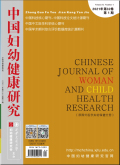中国妇幼健康研究2024,Vol.35Issue(7):12-16,5.DOI:10.3969/j.issn.1673-5293.2024.07.002
综合干预对儿童视屏时间影响的研究
Effect of comprehensive intervention on children's screen time
摘要
Abstract
Objective To analyze effect of a comprehensive intervention project DECIDE-children on children's screen time and to explore potential mediating factors,so as to provide a basis for controlling children's screen time.Methods A cluster-stratified random sampling was conducted in 24 primary schools in Beijing,Shanxi Province and Xinjiang Uygur Autonomous Region.A total of 1 392 fourth-grade students were enrolled and they were divided into intervention group or control group at a 1:1 ratio.The children in the intervention group received a comprehensive intervention on diet and physical activities for one academic year,while those children in the control group remained to receive regular teaching activities.The data such as children's average daily screen time,knowledge about exercise and screen time,as well as parental limitations on children's screen time were collected by using a questionnaire at baseline and final follow-up survey.Linear regression and generalized linear regression models were applied for association analysis.The non-parametric percentile Bootstrap method was used to test mediating effects to adjust age and gender at baseline.Results At baseline,among the 1 392 study subjects,289 children(20.8% )had a daily screen time ≥ 2 hours.Compared to the baseline,at the final follow-up survey,the proportion of the parents who limited children's screen time less than 2h/d(ORadj=1.64,P=0.002)and the proportion of the children who achieved full scores in exercise and screen knowledge(ORadj=2.27,P<0.001)in the intervention group increased greatly.And decrement in the proportion of the children with a screen time≥2h/d in the intervention group was greater than the control group(ORadj=0.57,P<0.001).The mediating effect test shown that the mediating effect of parental limitations on children's screen time less than 2h/d accounted for 4.01% of total effect(P<0.05),while the mediating effect of children's exercise and screen knowledge accounted for 11.40% of total effect(P<0.05).Conclusion This comprehensive intervention project can improve the proportion of children with a daily screen time meeting the guideline recommendation,of which,parental limitations on children's daily screen time and children's knowledge of exercise and screen exert partial mediating roles in reducing children's screen time.关键词
视屏时间/家长限制/儿童知识/干预/中介效应Key words
screen time/parental limitation/children knowledge/intervention/mediating effect分类
医药卫生引用本文复制引用
王璐,段宇祺,岳芷涵,吕瑾莨,王辉,王海俊..综合干预对儿童视屏时间影响的研究[J].中国妇幼健康研究,2024,35(7):12-16,5.基金项目
国家自然科学基金项目(81973053) (81973053)
国家重点研发计划项目(2016YFC1300204) (2016YFC1300204)

